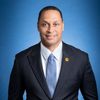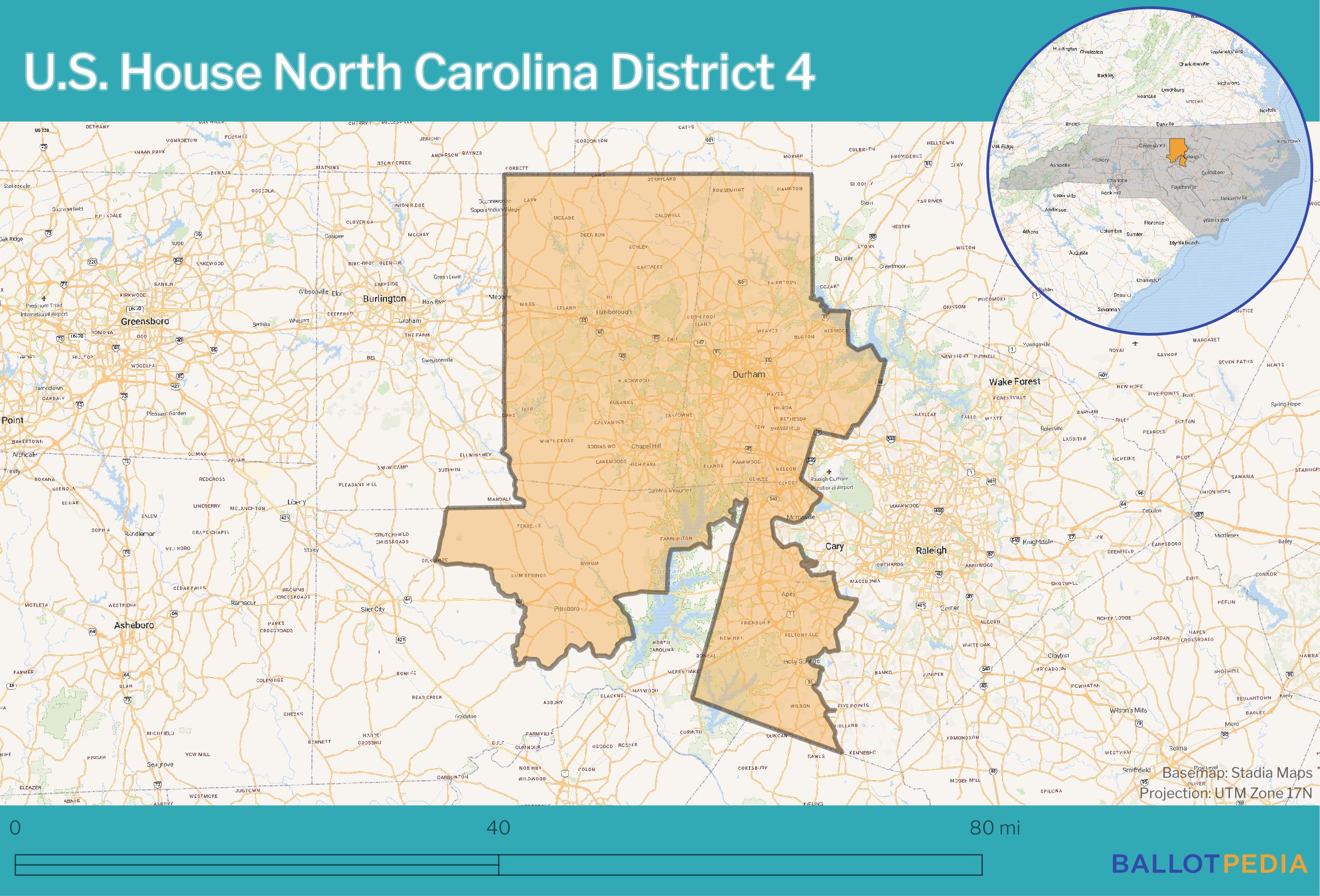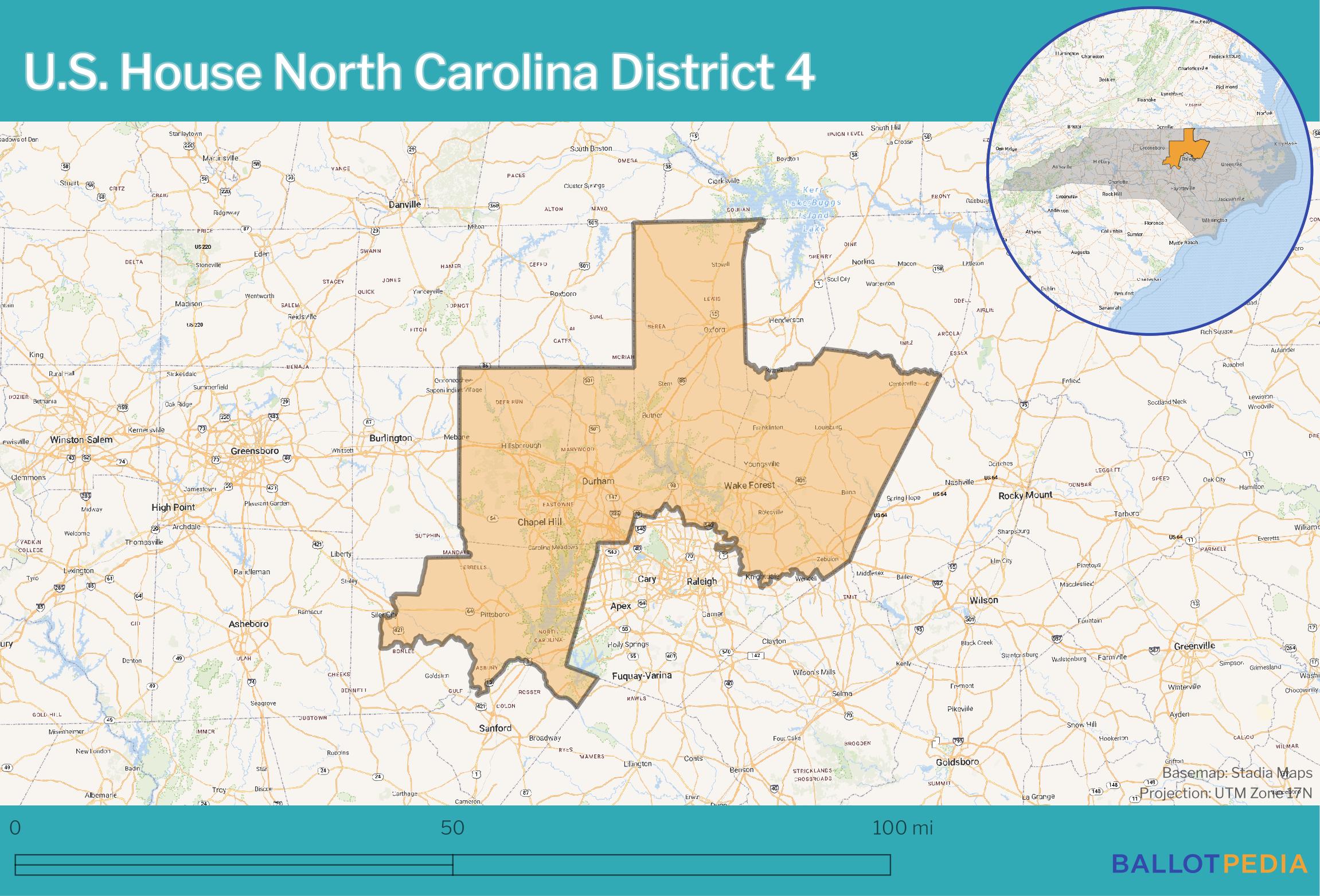North Carolina's 4th Congressional District

North Carolina's 4th Congressional District in the United States House of Representatives is represented by Valerie Foushee (D).
As of the 2020 Census, North Carolina representatives represented an average of 746,711 residents. After the 2010 Census, each member represented 735,829 residents.
Elections
See also: North Carolina's 4th Congressional District election, 2030
There are no official candidates yet for this election.
See also: North Carolina's 4th Congressional District election, 2028
There are no official candidates yet for this election.
See also: North Carolina's 4th Congressional District election, 2026
General election
The primary occurred on March 3, 2026. The general election will occur on November 3, 2026. General election candidates will be added here following the primary.
The candidate list in this election may not be complete.
General election for U.S. House North Carolina District 4
Mahesh Ganorkar (R) and Guy Meilleur (L) are running in the general election for U.S. House North Carolina District 4 on November 3, 2026.
Candidate | ||
 | Mahesh Ganorkar (R) | |
 | Guy Meilleur (L) | |
 = candidate completed the Ballotpedia Candidate Connection survey. = candidate completed the Ballotpedia Candidate Connection survey. | ||||
| If you are a candidate and would like to tell readers and voters more about why they should vote for you, complete the Ballotpedia Candidate Connection Survey. | ||||
Do you want a spreadsheet of this type of data? Contact our sales team. | ||||
Democratic primary
The candidate list in this election may not be complete.
Democratic primary for U.S. House North Carolina District 4
Incumbent Valerie Foushee (D), Nida Allam (D), and Mary Patterson (D) ran in the Democratic primary for U.S. House North Carolina District 4 on March 3, 2026.
Candidate | ||
 | Valerie Foushee | |
 | Nida Allam | |
| Mary Patterson | ||
 = candidate completed the Ballotpedia Candidate Connection survey. = candidate completed the Ballotpedia Candidate Connection survey. | ||||
| If you are a candidate and would like to tell readers and voters more about why they should vote for you, complete the Ballotpedia Candidate Connection Survey. | ||||
Do you want a spreadsheet of this type of data? Contact our sales team. | ||||
Republican primary
The Republican primary scheduled for March 3, 2026, was canceled. Mahesh Ganorkar (R) advanced from the Republican primary for U.S. House North Carolina District 4 without appearing on the ballot.
Libertarian Party primary
The Libertarian Party primary scheduled for March 3, 2026, was canceled. Guy Meilleur (L) advanced from the Libertarian Party primary for U.S. House North Carolina District 4 without appearing on the ballot.
See also: North Carolina's 4th Congressional District election, 2024
General election
General election for U.S. House North Carolina District 4
Incumbent Valerie Foushee (D) defeated Eric Blankenburg (R) and Guy Meilleur (L) in the general election for U.S. House North Carolina District 4 on November 5, 2024.
Candidate | % | Votes | ||
| ✔ |  | Valerie Foushee (D) | 71.8 | 308,064 |
 | Eric Blankenburg (R)  | 26.1 | 112,084 | |
 | Guy Meilleur (L) | 2.0 | 8,632 | |
| Total votes: 428,780 | ||||
 = candidate completed the Ballotpedia Candidate Connection survey. = candidate completed the Ballotpedia Candidate Connection survey. | ||||
| If you are a candidate and would like to tell readers and voters more about why they should vote for you, complete the Ballotpedia Candidate Connection Survey. | ||||
Do you want a spreadsheet of this type of data? Contact our sales team. | ||||
Democratic primary
The Democratic primary scheduled for March 5, 2024, was canceled. Incumbent Valerie Foushee (D) advanced from the Democratic primary for U.S. House North Carolina District 4 without appearing on the ballot.
Republican primary
Republican primary for U.S. House North Carolina District 4
Eric Blankenburg (R) defeated Mahesh Ganorkar (R) in the Republican primary for U.S. House North Carolina District 4 on March 5, 2024.
Candidate | % | Votes | ||
| ✔ |  | Eric Blankenburg  | 70.4 | 25,254 |
 | Mahesh Ganorkar | 29.6 | 10,597 | |
| Total votes: 35,851 | ||||
 = candidate completed the Ballotpedia Candidate Connection survey. = candidate completed the Ballotpedia Candidate Connection survey. | ||||
| If you are a candidate and would like to tell readers and voters more about why they should vote for you, complete the Ballotpedia Candidate Connection Survey. | ||||
Do you want a spreadsheet of this type of data? Contact our sales team. | ||||
Withdrawn or disqualified candidates
- Leonard Harrison (R)
Libertarian Party primary
The Libertarian Party primary scheduled for March 5, 2024, was canceled. Guy Meilleur (L) advanced from the Libertarian Party primary for U.S. House North Carolina District 4 without appearing on the ballot.
See also: North Carolina's 4th Congressional District election, 2022
General election
General election for U.S. House North Carolina District 4
Valerie Foushee (D) defeated Courtney Geels (R) in the general election for U.S. House North Carolina District 4 on November 8, 2022.
Candidate | % | Votes | ||
| ✔ |  | Valerie Foushee (D) | 66.9 | 194,983 |
 | Courtney Geels (R)  | 33.1 | 96,442 | |
| Total votes: 291,425 | ||||
 = candidate completed the Ballotpedia Candidate Connection survey. = candidate completed the Ballotpedia Candidate Connection survey. | ||||
| If you are a candidate and would like to tell readers and voters more about why they should vote for you, complete the Ballotpedia Candidate Connection Survey. | ||||
Do you want a spreadsheet of this type of data? Contact our sales team. | ||||
Democratic primary
Democratic primary for U.S. House North Carolina District 4
The following candidates ran in the Democratic primary for U.S. House North Carolina District 4 on May 17, 2022.
Candidate | % | Votes | ||
| ✔ |  | Valerie Foushee | 46.1 | 40,806 |
 | Nida Allam | 37.0 | 32,731 | |
 | Clay Aiken | 7.4 | 6,529 | |
 | Ashley Ward  | 5.4 | 4,767 | |
 | Richard Watkins  | 1.3 | 1,155 | |
 | Crystal Cavalier  | 1.3 | 1,116 | |
 | Stephen J. Valentine  | 1.2 | 1,023 | |
| Matt Grooms | 0.5 | 435 | ||
| Total votes: 88,562 | ||||
 = candidate completed the Ballotpedia Candidate Connection survey. = candidate completed the Ballotpedia Candidate Connection survey. | ||||
| If you are a candidate and would like to tell readers and voters more about why they should vote for you, complete the Ballotpedia Candidate Connection Survey. | ||||
Do you want a spreadsheet of this type of data? Contact our sales team. | ||||
Republican primary
Republican primary for U.S. House North Carolina District 4
Courtney Geels (R) defeated Robert Thomas (R) in the Republican primary for U.S. House North Carolina District 4 on May 17, 2022.
Candidate | % | Votes | ||
| ✔ |  | Courtney Geels  | 64.5 | 19,645 |
 | Robert Thomas | 35.5 | 10,793 | |
| Total votes: 30,438 | ||||
 = candidate completed the Ballotpedia Candidate Connection survey. = candidate completed the Ballotpedia Candidate Connection survey. | ||||
| If you are a candidate and would like to tell readers and voters more about why they should vote for you, complete the Ballotpedia Candidate Connection Survey. | ||||
Do you want a spreadsheet of this type of data? Contact our sales team. | ||||
Withdrawn or disqualified candidates
- Rene Borghese (R)
- Erik Fredsell (R)
- Craig Kinsey (R)
- Nat Robertson (R)
- John Szoka (R)
See also: North Carolina's 4th Congressional District election, 2020
General election
General election for U.S. House North Carolina District 4
Incumbent David Price (D) defeated Robert Thomas (R) in the general election for U.S. House North Carolina District 4 on November 3, 2020.
Candidate | % | Votes | ||
| ✔ |  | David Price (D) | 67.3 | 332,421 |
 | Robert Thomas (R)  | 32.7 | 161,298 | |
| Total votes: 493,719 | ||||
 = candidate completed the Ballotpedia Candidate Connection survey. = candidate completed the Ballotpedia Candidate Connection survey. | ||||
| If you are a candidate and would like to tell readers and voters more about why they should vote for you, complete the Ballotpedia Candidate Connection Survey. | ||||
Do you want a spreadsheet of this type of data? Contact our sales team. | ||||
Democratic primary
Democratic primary for U.S. House North Carolina District 4
Incumbent David Price (D) defeated Daniel Ulysses Lockwood (D) in the Democratic primary for U.S. House North Carolina District 4 on March 3, 2020.
Candidate | % | Votes | ||
| ✔ |  | David Price | 86.7 | 153,322 |
 | Daniel Ulysses Lockwood  | 13.3 | 23,564 | |
| Total votes: 176,886 | ||||
 = candidate completed the Ballotpedia Candidate Connection survey. = candidate completed the Ballotpedia Candidate Connection survey. | ||||
| If you are a candidate and would like to tell readers and voters more about why they should vote for you, complete the Ballotpedia Candidate Connection Survey. | ||||
Do you want a spreadsheet of this type of data? Contact our sales team. | ||||
Withdrawn or disqualified candidates
- Martha Brock (D)
- Curtis Sobie (D)
Republican primary
Republican primary for U.S. House North Carolina District 4
Robert Thomas (R) defeated Debesh Sarkar (R), Steve Von Loor (R), and Nasir Shaikh (R) in the Republican primary for U.S. House North Carolina District 4 on March 3, 2020.
Candidate | % | Votes | ||
| ✔ |  | Robert Thomas  | 48.3 | 17,474 |
| Debesh Sarkar | 23.0 | 8,320 | ||
 | Steve Von Loor | 17.3 | 6,238 | |
| Nasir Shaikh | 11.4 | 4,127 | ||
| Total votes: 36,159 | ||||
 = candidate completed the Ballotpedia Candidate Connection survey. = candidate completed the Ballotpedia Candidate Connection survey. | ||||
| If you are a candidate and would like to tell readers and voters more about why they should vote for you, complete the Ballotpedia Candidate Connection Survey. | ||||
Do you want a spreadsheet of this type of data? Contact our sales team. | ||||
See also: United States House of Representatives elections in North Carolina, 2018
General election
General election for U.S. House North Carolina District 4
Incumbent David Price (D) defeated Steve Von Loor (R) and Barbara Howe (L) in the general election for U.S. House North Carolina District 4 on November 6, 2018.
Candidate | % | Votes | ||
| ✔ |  | David Price (D) | 72.4 | 247,067 |
 | Steve Von Loor (R) | 24.0 | 82,052 | |
 | Barbara Howe (L) | 3.6 | 12,284 | |
| Total votes: 341,403 (100% precincts reporting) | ||||
 = candidate completed the Ballotpedia Candidate Connection survey. = candidate completed the Ballotpedia Candidate Connection survey. | ||||
| If you are a candidate and would like to tell readers and voters more about why they should vote for you, complete the Ballotpedia Candidate Connection Survey. | ||||
Do you want a spreadsheet of this type of data? Contact our sales team. | ||||
Democratic primary
Democratic primary for U.S. House North Carolina District 4
Incumbent David Price (D) defeated Michelle Laws (D) and Richard Watkins (D) in the Democratic primary for U.S. House North Carolina District 4 on May 8, 2018.
Candidate | % | Votes | ||
| ✔ |  | David Price | 77.1 | 52,203 |
 | Michelle Laws | 16.4 | 11,120 | |
 | Richard Watkins | 6.5 | 4,391 | |
| Total votes: 67,714 | ||||
 = candidate completed the Ballotpedia Candidate Connection survey. = candidate completed the Ballotpedia Candidate Connection survey. | ||||
| If you are a candidate and would like to tell readers and voters more about why they should vote for you, complete the Ballotpedia Candidate Connection Survey. | ||||
Do you want a spreadsheet of this type of data? Contact our sales team. | ||||
Republican primary
Republican primary for U.S. House North Carolina District 4
Steve Von Loor (R) advanced from the Republican primary for U.S. House North Carolina District 4 on May 8, 2018.
Candidate | ||
| ✔ |  | Steve Von Loor |
 = candidate completed the Ballotpedia Candidate Connection survey. = candidate completed the Ballotpedia Candidate Connection survey. | ||||
| If you are a candidate and would like to tell readers and voters more about why they should vote for you, complete the Ballotpedia Candidate Connection Survey. | ||||
Do you want a spreadsheet of this type of data? Contact our sales team. | ||||
Withdrawn or disqualified candidates
- Lee Brian (R)
Libertarian Party primary
Libertarian primary for U.S. House North Carolina District 4
Barbara Howe (L) defeated Scerry Perry Whitlock (L) in the Libertarian Party primary for U.S. House North Carolina District 4 on May 8, 2018.
Candidate | % | Votes | ||
| ✔ |  | Barbara Howe | 76.9 | 528 |
| Scerry Perry Whitlock | 23.1 | 159 | ||
| Total votes: 687 | ||||
 = candidate completed the Ballotpedia Candidate Connection survey. = candidate completed the Ballotpedia Candidate Connection survey. | ||||
| If you are a candidate and would like to tell readers and voters more about why they should vote for you, complete the Ballotpedia Candidate Connection Survey. | ||||
Do you want a spreadsheet of this type of data? Contact our sales team. | ||||
District map

Redistricting
2025-2026
North Carolina redrew its congressional map ahead of the 2026 elections. The state Senate approved a new congressional map on October 21, 2025, and the state House followed on October 22, 2025.[9][10] The New York Times' Eduardo Medina wrote, "Republicans already have control of 10 of the state’s 14 congressional seats. The new map could give them an extra seat in the First Congressional District, which previously included all eight of the state’s majority Black counties and has now been redrawn to include more conservative-leaning counties. The district is currently held by Representative Don Davis, a Democrat."[11]
2020-2023
On October 25, 2023, the North Carolina General Assembly adopted new congressional district boundaries.[12] The legislation adopting the new maps passed the state Senate by a vote of 28-18 and the State House by a vote of 64-40.[13] Both votes were strictly along party lines with all votes in favor by Republicans and all votes against by Democrats.[14][15]
The New York Times' Maggie Astor wrote, "The map creates 10 solidly Republican districts, three solidly Democratic districts and one competitive district. Currently, under the lines drawn by a court for the 2022 election, each party holds seven seats. The Democratic incumbents who have been essentially drawn off the map are Representatives Jeff Jackson in the Charlotte area, Kathy Manning in the Greensboro area and Wiley Nickel in the Raleigh area. A seat held by a fourth Democrat, Representative Don Davis, is expected to be competitive."[12]
How does redistricting in North Carolina work? In North Carolina, the state legislature is responsible for drawing both congressional and state legislative district lines. District maps cannot be vetoed by the governor. State legislative redistricting must take place in the first regular legislative session following the United States Census. There are no explicit deadlines in place for congressional redistricting.[16]
State law establishes the following requirements for state legislative districts:[16]
- Districts must be contiguous and compact.
- Districts "must cross county lines as little as possible." If counties are grouped together, the group should include as few counties as possible.
- Communities of interest should be taken into account.
There are no similar restrictions in place regarding congressional districts.[16]
Below are the congressional maps in effect before and after the 2020 redistricting cycle. The map on the right was in effect for North Carolina’s 2024 congressional elections.
Below are the congressional maps in effect before and after the 2020 redistricting cycle. The map on the right was in effect for North Carolina’s 2024 congressional elections.
Below are the congressional maps in effect before and after the 2020 redistricting cycle. The map on the right was in effect for North Carolina’s 2024 congressional elections.
2020

2024

North Carolina's congressional district plan was subject to litigation following its adoption in 2011. Two challenges to the plan were heard by the Supreme Court of the United States: Cooper v. Harris, which was decided in 2017, and Rucho v. Common Cause, which decided on June 27, 2019. As a result of Rucho, North Carolina's congressional district plan was upheld. For more complete information, see this article.
District analysis
- See also: The Cook Political Report's Partisan Voter Index
- See also: FiveThirtyEight's elasticity scores
2026
Heading into the 2026 elections, based on results from the 2024 and 2020 presidential elections, the Cook Partisan Voter Index for this district is D+23. This meant that in those two presidential elections, this district's results were 23 percentage points more Democratic than the national average. This made North Carolina's 4th the 41st most Democratic district nationally.[17]
2024
Heading into the 2024 elections, based on results from the 2020 and 2016 presidential elections, the Cook Partisan Voter Index for this district was D+21. This meant that in those two presidential elections, this district's results were 21 percentage points more Democratic than the national average. This made North Carolina's 4th the 60th most Democratic district nationally.[18]
Daily Kos calculated what the results of the 2020 presidential election in this district would have been following redistricting. Joe Biden (D) would have defeated Donald Trump (R) 72.4%-26.2%.[19]
2022
Heading into the 2022 elections, based on results from the 2020 and 2016 presidential elections, the Cook Partisan Voter Index for this district was D+16. This meant that in those two presidential elections, this district's results were 16 percentage points more Democratic than the national average. This made North Carolina's 4th the 85th most Democratic district nationally.[20]
Daily Kos calculated what the results of the 2020 presidential election in this district would have been following redistricting. Joe Biden (D) would have received 66.9% of the vote in this district and Donald Trump (R) would have received 31.9%.[21]
2018
Heading into the 2018 elections, based on results from the 2016 and 2012 presidential elections, the Cook Partisan Voter Index for this district was D+14. This meant that in those two presidential elections, this district's results were 14 percentage points more Democratic than the national average. This made North Carolina's 4th Congressional District the 96th most Democratic nationally.[22]
FiveThirtyEight's September 2018 elasticity score for states and congressional districts measured "how sensitive it is to changes in the national political environment." This district's elasticity score was 0.94. This means that for every 1 point the national political mood moved toward a party, the district was expected to move 0.94 points toward that party.[23]
See also
- Redistricting in North Carolina
- North Carolina's 4th Congressional District election, 2026
- North Carolina's 4th Congressional District election, 2024
- North Carolina's 4th Congressional District election, 2022
- North Carolina's 4th Congressional District election, 2020
- North Carolina's 4th Congressional District election, 2018
External links
Footnotes
- ↑ North Carolina State Board of Elections, "June Primary Candidates," accessed March 27, 2016
- ↑ Politico, "2012 Election Map, North Carolina," accessed November 7, 2012
- ↑ U.S. Congress House Clerk, "Statistics of the Congressional Election of November 2, 2010," accessed March 28, 2013
- ↑ U.S. Congress House Clerk, "Statistics of the Congressional Election of November 4, 2008," accessed March 28, 2013
- ↑ U.S. Congress House Clerk, "Statistics of the Congressional Election of November 7, 2006," accessed March 28, 2013
- ↑ U.S. Congress House Clerk, "Statistics of the Congressional Election of November 2, 2004," accessed March 28, 2013
- ↑ U.S. Congress House Clerk, "Statistics of the Congressional Election of November 5, 2002," accessed March 28, 2013
- ↑ U.S. Congress House Clerk, "Statistics of the Congressional Election of November 7, 2000," accessed March 28, 2013
- ↑ Cite error: Invalid
<ref>tag; no text was provided for refs namedsenatepass - ↑ Cite error: Invalid
<ref>tag; no text was provided for refs namedhousepass - ↑ New York Times, "North Carolina State Senate Approves New Congressional Map in Effort to Add a Seat," October 21, 2025
- ↑ 12.0 12.1 The New York Times, "North Carolina Republicans Approve House Map That Flips at Least Three Seats," October 26, 2023
- ↑ North Caroliina General Assembly, "Senate Bill 757 / SL 2023-145," accessed October 26, 2023
- ↑ North Caroliina General Assembly, "House Roll Call Vote Transcript for Roll Call #613," accessed October 26, 2023
- ↑ North Caroliina General Assembly, "Senate Roll Call Vote Transcript for Roll Call #492," accessed October 26, 2023
- ↑ 16.0 16.1 16.2 All About Redistricting, "North Carolina," accessed April 20, 2015
- ↑ Cook Political Report, "2025 Cook PVI℠: District Map and List (119th Congress)," accessed July 1, 2025
- ↑ Cook Political Report, "The 2022 Cook Partisan Voting Index (Cook PVI℠)," accessed January 10, 2024
- ↑ Daily Kos, "Daily Kos Elections' 2020 presidential results by congressional district, for new and old districts," accessed September 15, 2022
- ↑ Cook Political Report, "The 2022 Cook Partisan Voting Index (Cook PVI℠)," accessed February 6, 2023
- ↑ Daily Kos, "Daily Kos Elections' 2020 presidential results by congressional district, for new and old districts," accessed September 15, 2022
- ↑ Cook Political Report, "Introducing the 2017 Cook Political Report Partisan Voter Index," April 7, 2017
- ↑ FiveThirtyEight, "Election Update: The Most (And Least) Elastic States And Districts," September 6, 2018



